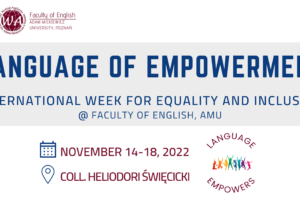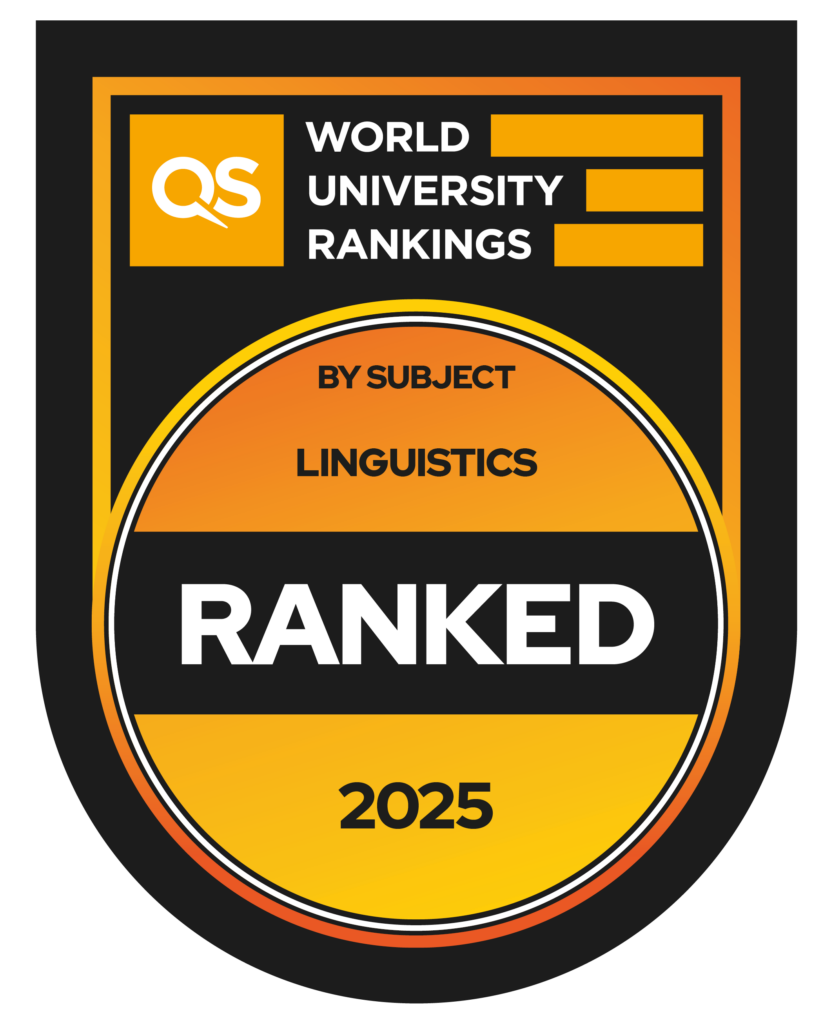Data publikacji w serwisie: 2 listopada 2022 r.
Language of Empowerment: International Week for Equality and Inclusion @Faculty of English AMU (14-18.11.2022)

Wydział Anglistyki Uniwersytetu im. Adama Mickiewicza w Poznaniu zaprasza do udziału w trzeciej edycji corocznego cyklu seminariów pt. “Language of Empowerment” w ramach wydarzenia International Week for Equality and Inclusion, odbywającego się w dniach 14-18 listopada 2022.
Wydarzenie to będzie okazją do przedstawienia zagrożeń wynikających z różnych form dyskryminacji oraz szansą na zabranie głosu w dyskusji na temat znaczenia takich wartości jak równość i akceptacja. A to wszystko w duchu proklamacji UNESCO mówiącej, że:
“Tolerancja to szacunek, akceptacja i uznanie bogactwa różnorodności kultur na świecie, naszych form wyrazu i sposobów na bycie człowiekiem. Sprzyja jej wiedza, otwartość, komunikowanie się oraz wolność słowa, sumienia i wiary. Tolerancja jest harmonią w różnorodności. To nie tylko moralny obowiązek, ale także prawny i polityczny warunek. Tolerancja – wartość, która czyni możliwym pokój – przyczynia się do zastąpienia kultury wojny kulturą pokoju.” (Deklaracja Zasad Tolerancji przyjęta przez UNESCO w 1995 roku).
“Language of Empowerment” to pięć 45-minutowych wykładów w języku angielskim (poniedziałek-środa) i polskim (czwartek-piątek).
Miejsce: Aula Collegium Heliodori Święcicki, ul. Grunwaldzka 6 Poznań
The Faculty of English at Adam Mickiewicz University, Poznan, cordially invites everyone to participate in the third edition of our annual seminar series entitled “Language of Empowerment” as part of the International Week for Equality and Inclusion between the 14th and 18th November 2022. Through this event, we aim to raise awareness of the dangers of discrimination and contribute to the global debate on values such as acceptance and equality, in accordance with the UNESCO proclamation that:
“Tolerance is respect, acceptance and appreciation of the rich diversity of our world’s cultures, our forms of expression and ways of being human. It is fostered by knowledge, openness, communication, and freedom of thought, conscience and belief. Tolerance is harmony in difference. It is not only a moral duty, it is also a political and legal requirement. Tolerance, the virtue that makes peace possible, contributes to the replacement of the culture of war by a culture of peace.” (UNESCO’s 1995 Declaration of Principles on Tolerance).
The “Language of Empowerment” at the Faculty of English AMU will feature five 45-minute lectures delivered in English (Monday-Wednesday) and Polish (Thursday-Friday).
Venue: Auditorium, Collegium Heliodori Święcicki, Grunwaldzka 6, Poznań
PROGRAM
PONIEDZIAŁEK, 14/11/2022, 15:00
Otwarcie wydarzenia: prof. Joanna Pawelczyk, Dziekana Wydziału Anglistyki Uniwersytetu im. Adama Mickiewicza w Poznaniu
Emma Dawson Varughese, Manipal Centre for Humanities, MAHE, Manipal, India
Feminist empowerment and visual language: An analysis of Neelima P. Aryan’s short graphic story ‘the prey’
This talk explores a short graphic story by Neelima P. Aryan, a Delhi-based artist from Kerala, South India entitled ‘the prey’. Dark in both form and content, the story narrates one young woman’s attempts at re-ordering a violent world where women are regarded as (sexual) ‘prey’. Replete with dark imagery, this short graphic story portrays India in a challenging light, usurping traditional paradigms of representing India in auspicious visual ways. The talk considers how the specifics of ‘visual language’ communicate a sense of female empowerment in this narrative and relatedly, the role Indian graphic narratives are playing in storying ‘New India’ more broadly.
WTOREK, 15/11/2022, 15:00
Katarzyna Bronk-Bacon, Wydział Anglistyki UAM
Eighteenth- and nineteenth-century epistolary lessons on ageing and old age
Age studies and humanist gerontology have been exploring the contradictory attitudes toward and perception of senescence, showing it, in the words of Ronald Blythe, as both “a tolerable achievement and (…) a disaster” (qtd. in Cole 1987: 5). Both disciplines attempt to find meaning in the experience of ageing into old age, seeing it as a necessary survival technique or a self-defence mechanism in the face of the approaching conclusion of the final stage of life. The pedagogy of old age points to older generations not only as recipients of knowledge but, more importantly, as the teachers on ageing and old age themselves, proving that “old age makes sense [mostly] ‘from the inside’” (Carson 1987: xii). This presentation looks at eighteenth- and nineteenth-century letters in search of autobiographical lessons on what it means to age into old age. Investigating the imagery and the language used by individuals such as, for example, Horace Walpole, the 4th earl of Chesterfield, Hannah More or Mary Berry, the proposed age reading of private letters aims to pinpoint the ways and means in which these men and women of letters tried to empower themselves as repositories of wisdom and experience within their familial and social contexts.
ŚRODA, 16/11/2022, 15:00
Tomasz Wicherkiewicz, Wydział Neofilologii UAM
Language policies as tools of empowering marginalized language communities
The contemporary linguistic situation in the world is marked by a growing number of interdependent threats to linguistic diversity. This is due to the increasingly unstable ecology of individual language varieties, especially minority or minoritized languages, languages in danger of extinction, or marginalized ones. As in previous decades, one of the basic factors contributing to the intensification of these processes are various language policies. Unlike during most of the twentieth century, these are no longer solely repressive top-down language policies. In the face of the threat to the existence of many language communities, new/advanced language policies have emerged to reverse these processes, both as bottom-up ones, at the community grassroots, and at the international level, e.g., as language rights, particularly when perceived as one of human rights. During the talk, the repertoire and (potential) effectiveness of those tools will be considered. Particular attention will be paid to the discourse on language rights and the degree to which they influence the development and implementation of language policies or perpetuate inequalities in numerous language situations. Some practical possibilities of language empowerment as an asset of measures to raise the social status of languages and to make them more viable in handling various domains of use will also be presented.
CZWARTEK, 17/11/2022, 15:00
Rada Samorządu Studentów, Wydział Anglistyki UAM
Studenci, studentki i osoby studiujące: Inicjatywy Rady Samorządu Studentów
i społeczności studenckiej
Podczas studiowania Wydział powinien być komfortowym miejscem, gdzie każda osoba będzie czuła, że może się bezpiecznie rozwijać. Każda osoba studiująca na Wydziale tworzy tę społeczność, ale to Rada Samorządu powinna być wsparciem oraz pomocą w rozwiązywaniu problemów. Zaprezentujemy minione inicjatywy Rady Samorządu Studentów Wydziału Anglistyki, sposób ich planowania i przeprowadzania oraz prace naukowe osób z Wydziału Anglistyki, które wskazują problemy stereotypizacji poszczególnych grup społecznych.
(wykład odbędzie się w języku polskim)
PIĄTEK, 18/11/2022, 15:00
Dorota Zyskowska, Porsche Polska
Równouprawnienie w biznesie: Od teorii do praktyki
Wykład poświęcony będzie analizie stereotypizacji kobiet w biznesie oraz ich obecności na rynku pracy. Przestawione zostaną regulacje prawne oraz korzyści ekonomiczne i pozaekonomiczne wynikające z zatrudnienia kobiet, z uwzględnieniem statystyk i trendów. Omówione zostaną najważniejsze przyczyny dysproporcji w liczbie kobiet na stanowiskach kierowniczych wraz z ogólną charakterystyka zjawiska stereotypizacji kobiet w miejscu pracy, również w odniesieniu do branży motoryzacyjnej.
(wykład odbędzie się w języku polskim)

